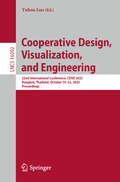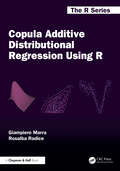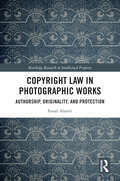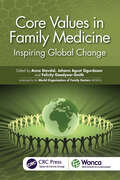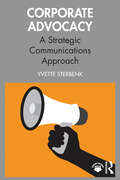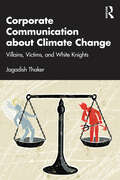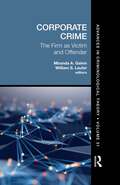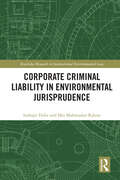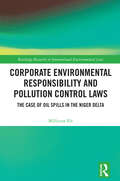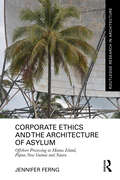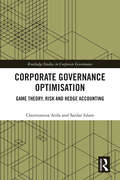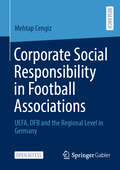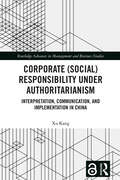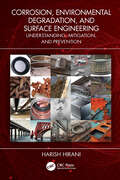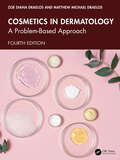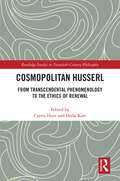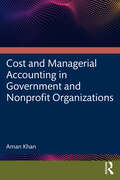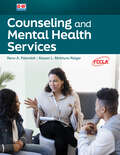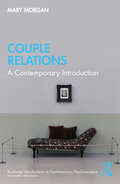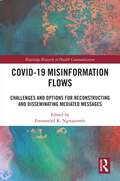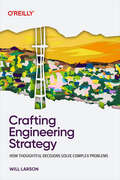- Table View
- List View
Cooperative Design, Visualization, and Engineering: 22nd International Conference, CDVE 2025, Bangkok, Thailand, October 19-22, 2025, Proceedings (Lecture Notes in Computer Science #16092)
by Yuhua LuoThis book constitutes the proceedings of the 22nd International Conference on Cooperative Design, Visualization, and Engineering, CDVE 2025, held in Bangkok, Thailand, during October 19-22, 2025. The 22 full papers and 3 short papers included in these proceedings were carefully reviewed and selected from 55 submissions. They focus on all aspects of model-based systems, engineering interoperability, IOT, natural language processing.
Copula Additive Distributional Regression Using R (Chapman & Hall/CRC The R Series)
by Giampiero Marra Rosalba RadiceCopula additive distributional regression enables the joint modeling of multiple outcomes, an essential aspect of many real-world research problems. This book provides an accessible overview of this modeling approach, with a particular focus on its implementation in the GJRM R package, developed by the authors. The emphasis is on bivariate responses with empirical illustrations drawn from diverse fields such as health and medicine, epidemiology, economics and social sciences.Key Features: Provides a comprehensive overview of joint regression modeling for multiple outcomes, with a focus on bivariate responses Offers a practical approach with real-world examples from various fields Demonstrates the implementation of all the discussed models using the GJRM package in R Includes supplementary resources such as data accessible through the GJRM.data package in R and additional code available on the authors' webpages This book is designed for graduate students, researchers, practitioners and analysts who are interested in using copula additive distributional regression for the joint modeling of bivariate outcomes. The methodology is accessible to readers with a basic understanding of core statistics and probability, regression, copula modeling and R.
Copyright Law in Photographic Works: Authorship, Originality, and Protection (Routledge Research in Intellectual Property)
by Faisal AlamriThis book presents an original theory of copyright authorship tailored for photographic works, grounded in the concepts of categorical intention, channelled selection, and causation. By addressing the unique dual nature of photography, where mechanical processes intersect with creative choices, it offers a fresh perspective on a longstanding legal challenge.Through a critical examination of select case law with a focus on Anglo-American law, the book highlights the complexities and inconsistencies in the current copyright protection for photographs due to their dual nature, which exhibits both mechanical and creative characteristics. It argues for moving beyond the conventional one-size-fits-all approach for copyright concepts in favour of adopting a tailored, contextual approach that acknowledges the nature and characteristics of the category of work in question. The book also alludes to emerging technologies such as artificial intelligence and machine learning models, considering their implications for copyright and creative expression. It also discusses how the history of copyright protection of photographic works may illuminate the path towards dealing with conflicts between copyright and perceived mechanical mediums of creative expression.This book will be of interest to researchers in copyright law and intellectual property law, especially those engaged with the legal treatment of mechanically produced creative works. It offers valuable insights into the evolving relationship between law, technology, and authorship in the digital age.
Core Values in Family Medicine: Inspiring Global Change (WONCA Family Medicine)
by Felicity Goodyear-Smith Anna Stavdal Johann Agust SigurdssonThis new book explores the core values of family medicine nationally, regionally, and globally, to identify if and/or where there is consensus and where these diversify in relation to contextual factors. Aligned with the WHO’s definition of primary healthcare and goal of universal health coverage and the United Nations Sustainable Development Goals, the book documents a global enquiry by teams of experts representing each world region on the vision, mission, core values and principles, and definition of family medicine in different countries. Each team has adopted different approaches and strategies in their exploration, findings, and conclusions.A common identity for family doctors is important for research agendas, training, recognition of the specialty, and advocacy. However, there is much diversity within and across the regions in the training and the practice of the discipline of family medicine, reflected in the core values. The ultimate goal is a shared vocabulary of humanity for colleagues throughout the world, enriched rather than hindered by their differences.KEY FEATURES: Addresses the core values and principles in family medicine and primary care across the globe, built around the central elements of care that is patient centred, equable, and community and science oriented, with professionalism and cooperation as key themes Supports primary care/family medicine providers in their dual goals of caring for the whole person and adapting to the evolving needs of the population of people under their care, tailored to reflect the specific needs in different world regions Considers the challenges of fragmented care, digital technologies, comorbidities, and growing health inequity Accessible, practical, and international The book will be an invaluable guide for general practitioners, family physicians, family medicine specialists, and other primary care doctors and a useful reference for other primary care health professionals including practice, school and other primary care nurses, medical assistants, paramedics, and community pharmacists. It will also serve as recommended or supplementary reading in undergraduate medical and nursing programmes, in university-based postgraduate courses and master programmes in relevant primary care–related topics, and in vocational training programmes in general practice/family medicine.
Corporate Advocacy: A Strategic Communications Approach
by Yvette SterbenkProviding a foundational look at corporate advocacy from the perspective of strategic communications, this book develops strategies for authentic and meaningful ways companies can engage in advocating for social issues in order to have the strongest and most positive impact on society and their business.Customers, employees, investors, and other stakeholders increasingly expect companies to address complex, and sometimes divisive, sociopolitical issues. Communications professionals must determine how best to engage with those issues, both internally and externally, while considering a variety of operational and reputational factors. This text prepares readers to incorporate corporate advocacy into future communications roles in ethical, thoughtful, and strategic ways. It starts by providing a contextual and theoretical foundation for the topic, continues with an exploration of the perspectives of various stakeholder groups, and then focuses on the most ethical practices for communicating and acting on a company’s advocacy stance.Ideal as a primary text at the advanced undergraduate or master's level in a corporate advocacy course or a supplementary text in a corporate social responsibility (CSR) communication, public relations (PR), strategic communication, or marketing course, this text is also well suited to new professional communicators.An instructor’s manual with suggestions for in-class exercises and assignments and links to further resources is available at www.routledge.com/9781032595542.
Corporate Communication about Climate Change: Villains, Victims, and White Knights
by Jagadish ThakerEmbedded in the emerging field of climate change communication, Thaker provides a comprehensive analysis of enablers and barriers to corporate action on climate change, business role and influence on media coverage of climate change, and its impact on public opinion and the policy-making process.Focusing on extensive academic research, business reports, case studies, and best practices from around the world, this book offers a practical guide to effective strategies in corporate climate change communication, including leadership communication, rebuilding public trust amidst greenwashing scandals, and engaging stakeholders with business action on climate change. The book provides new directions on the role of social media influencers, artificial intelligence, and big data in enhancing transparency in business actions and effective communication with key stakeholders.This book is an essential read for students, scholars, and professionals interested in the emerging fields of climate change communication, strategic communication, and related areas of sustainability and Environmental, Social, and Corporate Governance (ESG) communication.
Corporate Crime: The Firm as Victim and Offender (Advances in Criminological Theory)
by William S. Laufer Miranda A. GalvinThis volume speaks to the fundamental issues inherent in trying to understand the who-what-where-and-whys of corporate crime. Only in addressing these larger issues does it become possible to begin to integrate the study of corporate crime into the larger criminological theory literature. A collection of chapters by experts in the field grapples with three deceptively simple questions: When are firms morally and legally responsible agents? What are the harms of corporate wrongdoing and who are the victims? What theories offer insight to explain corporate wrongdoing? In the first section, chapter authors wrestle with what it means for a corporation to have agency enough to commit a violation of law as well as what philosophies of punishment might apply when there is no body to jail. The second section focuses attention on the often unnamed, ambiguous, or even ignored victims of corporate crime. Many authors in this section take a broad view of “victimization,” speaking to the ways in which the intentional acts of corporations produce negative consequences for individuals and society at large through both the violation of law and the use of corporate power to produce laws that do not problematize corporate behavior. The third section turns to issues in corporate offending research, including the circumstances that beget offending, how corporations may be thought to have “life courses,” and the role of the State in structuring criminal opportunity. The editors wrap up the volume by proposing a framework for developing a more comprehensive system of criminal responsibility for corporate actors.The chapters in this volume underscore the failures of the current system and are intended to inspire readers to push for change. This important work will be of interest to a wide range of criminologists and has potential to shape the future of corporate crime theory and research. It is ideal for use in graduate seminars and upper-level undergraduate courses.
Corporate Criminal Liability in Environmental Jurisprudence (Routledge Research in International Environmental Law)
by Mia Mahmudur Rahim Indrajit DubeEnvironmental jurisprudence is a dynamic field that integrates insights from various disciplines, including basic sciences, earth science, economics, and law. At its core, this discipline emphasizes the importance of enforcing rights, as environmental pollution poses significant threats to individuals and society as a whole. The repercussions of pollution are not confined to the immediate vicinity; they can reverberate across vast regions and impact countless future generations. Addressing pollution as a wrong or crime demands a nuanced understanding of the law, making the study of environmental jurisprudence essential.This book explores corporate polluter liability within the framework of environmental jurisprudence. While protective measures for the environment have been embedded in various statutes since the early 20th century, the notion of environmental jurisprudence has only recently come to the forefront of legal discourse. This field is crucial for safeguarding the natural and legal rights of individuals, communities, and the state. With a comprehensive approach that encompasses both national and international dimensions, this book critically engages with the foundational concepts of environmental jurisprudence, exposing the rampant environmental violations perpetrated by corporations and outlining how these entities can be held accountable within regulatory frameworks. Furthermore, it provides a thorough analysis of essential international instruments aimed at combatting corporate-induced environmental degradation, offering recommendations to elevate corporate criminal liability within the realm of environmental jurisprudence scholarship.Highlighting the urgent need for accountability but also inspiring action toward a sustainable future, this book will interest legal scholars researching on criminal liability and environmental law.
Corporate Environmental Responsibility and Pollution Control Laws: The Case of Oil Spills in the Niger Delta (Routledge Research in International Environmental Law)
by Millicent EleThis book critically examines the corporate environmental responsibility of major oil companies operating in Nigeria’s Niger Delta, focusing on oil spills and comparing regulatory frameworks in Nigeria, the US, the UK, and the EU. It provides a theoretical foundation for holding these companies to the same environmental standards in Nigeria as they adhere to in more advanced jurisdictions.Analysing Shell’s oil spill environmental performance data, the book assesses how its operations in Nigeria compare with global performance figures. Additionally, it evaluates Nigerian environmental laws, highlighting deficiencies that may contribute to persistent oil pollution. Furthermore, it explores issues of regulatory capture, corporate environmental crime, and the transnational litigation of Nigerian oil spill cases in the US, the UK, and the EU. The Petroleum Industry Act (PIA) 2021 is comprehensively assessed in the context of corporate environmental governance and oil pollution control.To propose solutions, the book examines legal frameworks for strengthening corporate due diligence and accountability. It advocates for a robust legal regime to address the clean-up liability of pre-existing (stale) oil spills in the Niger Delta, drawing insights from the UK/EU laws on contaminated land, the US Comprehensive Environmental Response, Compensation, and Liability Act (CERCLA or the Superfund), and the UK laws on oil infrastructure decommissioning. Additionally, the book introduces a novel failure to prevent oil spill offence in Nigeria, an omission-based liability inspired by the UK Bribery Act 2010 and the UK Criminal Finances Act 2017.This book will be of interest to researchers and practitioners in the field of environmental law, pollution, and land law.
Corporate Ethics and the Architecture of Asylum: Offshore Processing at Manus Island, Papua New Guinea and Nauru (Routledge Research in Architecture)
by Jennifer FerngCorporate Ethics and the Architecture of Asylum engages innovative perspectives to understand our contemporary crisis of forced displacement and detention practices in the Pacific.Multinational contractors responsible for the construction and maintenance of regional processing centres in Papua New Guinea and Nauru have flourished as powerful historical actors, exerting global dominance over the lives of asylum seekers wishing to come to Australia. Transitioning from the policeman or security guard towards the subject of the asylum seeker, this book contends that entanglements between architecture and law represent important epistemic models to interrogate how asylum can be understood and reconceptualised. Proposing diverse forms of visual and textual evidence, asylum is repositioned as a dynamic, ever-changing countermeasure against xenophobic sentiments around offshore processing. Over six chapters, Corporate Ethics examines how the regional processing centres of Manus Island and Nauru are deeply connected to the intellectual discourses of care, environmental precarity, human rights, and sovereignty. From Rembrandt’s De Nachtwacht or Night Watch (1642) to recent advancements in artificial intelligence and legal testimonies, picturing the future of asylum serves as a critical tool to resist state authoritarianism and the rise of corporate malfeasance in the built environment.This book will be of interest to researchers and students of humanitarian architecture, architectural history, and Asia Pacific politics.
Corporate Governance Optimisation: Game Theory, Risk and Hedge Accounting (Routledge Studies in Corporate Governance)
by Sardar Islam Choirunnisa ArifaCorporate Governance Optimisation introduces an innovative approach to addressing some of the most pressing challenges in modern corporate governance. Combining game theory, mechanism design and hedge accounting, this research monograph offers a comprehensive framework for resolving agency conflicts, mitigating financial risks and improving organisational performance. At the heart of this book is an integrated model that unites governance, risk management and hedge accounting, demonstrating how these elements work together to address information asymmetry, incentive misalignment and decision-making complexities. Grounded in rigorous research and real-life data, the book provides practical insights into how hedge accounting can stabilise financial outcomes, support effective governance and enhance corporate value.Designed for academics, researchers and professionals in accounting, finance and corporate governance, this book bridges theory and practice, offering a robust foundation for understanding and applying advanced governance models. It is particularly valuable for those interested in how mathematical frameworks like game theory can be used to solve real-world corporate challenges. While rooted in financial optimisation, the book’s findings have broad implications for policy, strategy and risk management in diverse organisational contexts.
Corporate Social Responsibility in Football Associations: UEFA, DFB and the Regional Level in Germany
by Mehtap CengizThis Open Access book examines how football&’s governing bodies translate their public CSR commitments into everyday practice. Focusing on UEFA, the German Football Association (DFB) and a representative regional federation, it traces CSR from continental headquarters to local grassroots, revealing where lofty pledges of sustainability, diversity and community engagement prosper—and where they falter. Drawing on fourteen semi-structured interviews with senior officials and practitioners, the study exposes a persistent gap between externally promoted initiatives and the internal processes that should sustain them. It shows that CSR only achieves lasting impact when it is embedded in strategic planning, aligned with core football operations and subjected to rigorous monitoring. By presenting a grounded framework and practical guideline for associations at every tier, the author offers both scholars and decision-makers a roadmap for moving beyond performative gestures towards genuinely responsible governance in the world&’s most influential sport.
Corporate: Interpretation, Communication, and Implementation in China (Routledge Advances in Management and Business Studies)
by Xu KangThis book provides an in-depth exploration of corporate social responsibility (CSR) in the authoritarian context. It challenges prevailing CSR frameworks, which largely derive from liberal democratic contexts and overlook how political institutions shape the conceptualisation and practice of corporate responsibility. By situating CSR within China’s political-economic system, the book sheds light on how CSR is dynamically interpreted, strategically communicated, and selectively implemented by corporate and state actors.Drawing on a mixed-method research design, the study analyses both qualitative and quantitative evidence. The analysis integrates policy documents, regulatory frameworks, CSR and sustainability reports from Chinese corporations, and in-depth qualitative interviews with corporate managers, NGO leaders, and experts. The findings highlight how CSR in China emerges through the normative interplay between market logics and power politics, involving various actors, including enterprises, state entities, and NGOs. The book also presents a critical account of how Chinese companies strategically adapt CSR discourses to align with governmental priorities while navigating complex stakeholder relationships.A book of vital interest to researchers in business ethics, international business and Asian studies, it will also appeal to practitioners and policymakers seeking to enhance strategies and policies for responsible business conduct.
Corrosion, Environmental Degradation, and Surface Engineering: Understanding, Mitigation, and Prevention
by Harish HiraniCorrosion, Environmental Degradation, and Surface Engineering: Understanding, Mitigation, and Prevention offers an insightful exploration into the causes, mechanisms, and mitigation strategies of material degradation. This comprehensive work unravels the complexities of corrosion, wear, and fatigue, while showcasing cutting-edge techniques like surface engineering and predictive analytics. Packed with real-world case studies and innovative solutions, the book bridges the gap between theoretical concepts and practical applications.This book: Explores surface degradation mechanisms and commercial perspectives on surface degradation. Discusses dimensionless parameters in wear phenomena, fracture surface degradation, and the influence of heat and radiation on surface degradation. Covers environmental assisted surface deterioration, and factors affecting the atmospheric corrosion. Highlights the importance of digitization and data-driven approaches in engineering. Assesses the economic losses caused by corrosion degradation, and quantifies economic losses attributed to corrosion degradation. Ideal for students, researchers, and industry professionals, the book provides the tools and knowledge necessary to combat surface degradation and promote sustainability across critical sectors.
Cosmetics in Dermatology: A Problem-Based Approach
by Zoe Diana Draelos Matthew Michael DraelosCosmetics for skin, hair, and nails play a vital part in the management and treatment of many dermatological conditions; unfortunately, they may also at times be the cause of some dermatological problems. Dermatologists need to have a working knowledge of over-the-counter products to answer patient questions, make product recommendations to prevent disease recurrence, select products useful in disease maintenance, and enhance appearance. This text bridges the worlds of skin, hair, and nail care formulation, chemistry, ingredients, function, and utility for the physician.
Cosmopolitan Husserl: From Transcendental Phenomenology to the Ethics of Renewal (Routledge Studies in Twentieth-Century Philosophy)
by Halla Kim Curtis HuttThis volume reflects on the themes and topics presented in Edmund Husserl’s articles published in the popular Japanese magazine Kaizōin 1923. It addresses the cosmopolitan nature of Husserl’s work as well as the enduring appeal of Husserl’s cultural phenomenology for today’s globalized age.The notions of crisis and renewal are clearly central to the thought of Husserl in his outreach to Japanese readers in his Kaizō articles. For Husserl, something critical from the European past had to be renewed to stop the catastrophe embodied in the Great War and its aftermath from getting worse. This volume explores Husserl’s earliest work on European Krisis, his unexpected interest in history, as well as his overlooked contributions to religion, politics, and the ethics of renewal. The chapters are divided into four main parts. Part 1 addresses general issues in Husserl’s cultural phenomenology with special attention paid to topics pursued in the Kaizō. Part 2 provides new work on Husserl and global phenomenology. It considers Husserlian engagements with Japanese and other East Asian philosophical and religious traditions, as well as the relevance of Husserl’s work for the global South, from the Caribbean to Africa. This volume includes chapters in Parts 1 and 2 that attempt to assay Husserl’s relationship to the European “other” as encountered in Jewish thought. In Part 3, there is a review of the publication of the Kaizō work in addition to an early history of Husserlian phenomenology in Japan. The editors reproduce the content of the first Kaizō article in the appendix, Part 4, supplying new reader‑friendly English and Japanese translations.Cosmopolitan Husserl will appeal to researchers and graduate students as well as advanced undergraduate students and the general public who are interested in Husserl, phenomenology, comparative philosophy, and religious studies.
Cost and Managerial Accounting in Government and Nonprofit Organizations
by Aman KhanTo remain financially viable, all organizations, including government and nonprofit organizations, need to maximize efficiency, improve performance, and deal with complex problems. Managing costs and operations are two of the most essential elements for the successful operation of an organization. This timely book provides an introduction to cost and managerial accounting in government and nonprofit organizations, with an emphasis on cost basics, cost accounting methods, and cost management and control.The book is divided into three parts: Part I deals with cost basics, with an emphasis on basic cost concepts, cost behavior, and cost analysis. Part II discusses methods commonly used in cost accounting. Included in this category are job costing, contract costing, process costing, cost allocation, and activity-based costing. And Part III looks at cost management and control. Three topics are discussed here: standard costing, quality control, and budgeting for planning and control. The book concludes with a brief discussion of emerging trends in cost and managerial accounting. With an emphasis on relatability and practical applications, examples have been drawn from real government and nonprofit organizations. Graduate students in public administration and management, as well as practitioners in government and nonprofit organizations, will find this book an essential foundation for understanding public accounting’s unique challenges.
Counseling and Mental Health Services
by Reno A. Palombit Alyson L. McIntyre-ReigerCounseling and Mental Health Services is a text designed specifically for high school students who are interested in exploring facets of mental health services, including related careers like psychology and counseling, social work, psychiatry, and life coaching. The text begins by addressing students’ understanding of mental health, before expanding outward to relationships with others, structures of the nervous system and neurodivergence, disorders and treatments, and counseling and mental health careers and career skills. With a focus on self-reflection, this text guides students to understand mental health concepts before moving on to relationships, brain science, and career skills.
Countering Violent Extremism Policy in Bangladesh: A Public Policy Approach (Routledge Studies in Countering Violent Extremism)
by Md. Didarul IslamThis book investigates how Bangladesh formulates its Countering Violent Extremism (CVE) policy as a norm-receiving country.Norm-producing institutions and countries, such as the United Nations, the European Union, the UK, Australia, and Saudi Arabia, have diffused CVE norms in numerous countries through various mechanisms. Consequently, countries such as Bangladesh, Nigeria, Greece, Kenya, and many others, who initiated CVE policy late, became norm receivers. Despite widespread adoption and criticism of CVE policies globally, Bangladesh has shifted from traditional counterterrorism to CVE. This book provides the first comprehensive account of CVE policy formulation in Bangladesh through policy actor interviews. It offers a public policy perspective, integrating three theoretical dimensions: drivers of public policy; ideology, learning, and policy diffusion; and localisation. Through interviews with CVE policymakers, the book navigates policy actors’ understanding of effective CVE practices, contributing factors, and the diffusion and localisation of external policies and norms in Bangladesh.This book will be of interest to students of CVE, counterterrorism, South Asian politics, and international relations.
Couple Relations: A Contemporary Introduction (Routledge Introductions to Contemporary Psychoanalysis)
by Mary MorganIn this book, Mary Morgan provides a comprehensive understanding of couple relations. Taking a psychoanalytic perspective, Morgan explores some of the fundamental tensions in being part of a couple: between being an individual and a couple, relating, non-relating, and the narcissistic problem in tolerating the otherness and alienness of one’s partner. She guides the reader through managing feelings of both separateness and intimacy, issues around sex and sexuality, the tension between love and hate, and the importance of curiosity. She also elucidates key discoveries of unconscious processes in a couple relationship made by couple psychoanalysts, including unconscious choice of partner, the couple projective system, shared unconscious phantasy and beliefs, unconscious alliances, the couple’s own transference relationship and how the real "presence" of an other is seen as an "interference" acting on the preconceptions of the other subject. Through Morgan’s accessible and holistic approach, drawing on decades of clinical experience, this book is an essential resource for all psychoanalytic and psychodynamic psychotherapists, counsellors working with couples, and researchers and students in Gender Studies, social sciences, psychology and the humanities.
Covenants with Allāh: Keystone of Islam
by Halim Rane Ibrahim ZeinCovenants with Allāh: Keystone of Islam explores the binding commitments between God and humanity that define the terms and conditions of human existence and coexistence. It presents an illuminating study of the Qurʾān, covenants of Prophet Muḥammad, and the historical record of Muslim governance. In this timely and ground-breaking work, Halim Rane and Ibrahim Zein recover the centrality of covenant (ʿahd and mīthāq) in Islam and its enduring imperative for ensuring accountability, building trust, upholding justice, and safeguarding peace and security.In an era of profound global fracture and moral uncertainty, this book demonstrates that covenants are not peripheral but foundational to Islam’s theological and ethical architecture. It reveals how the Qurʾān’s covenantal ethos shaped Muslim consciousness, diplomacy, and interreligious relations—and how the violation of modern covenants and treaties threatens the very foundations of international law, justice, and order. Bold and urgent, rigorous but accessible, this is essential reading for anyone concerned with Islam, global justice, and our shared humanity.
Covid-19 Misinformation Flows: Challenges and Options for Reconstructing and Disseminating Mediated Messages (Routledge Research in Health Communication)
by Emmanuel K. NgwainmbiCovid-19 Misinformation Flows describes challenges in accessing, collecting, processing, and disseminating information on pandemics, with a focus on Covid-19 communication.An international team of authors addresses the role of disinformation and misinformation in managing the communication of epidemics; how social media platforms and mainstream media outlets in some countries and regions address pandemics in the context of the flow, learning, and sharing of information on Covid-19. Looking at how traditional media and social media report pandemics, especially Covid-19, the volume addresses the effect of fake news on individuals and businesses, and the impact of such communication on physical and mental health.This book will interest scholars and students of health communication, social media communication, journalism, political communication, and media and communication in the Global South.
Crabs
by Marley RichmondCrabs pinch and grip with strong claws. People may catch and cook crabs to eat! Beginning readers hone their phonics skills while learning all about crabs and where they live. As readers practice decoding words with r-blends, they gain science knowledge. Every Stairway Decodables nonfiction book combines multiple aspects of the Science of Reading to support small group instruction, independent reading, and reading practice at home.
Crafting Engineering Strategy: How Thoughtful Decisions Solve Complex Problems
by Will LarsonMany engineers assume their organization doesn't have an engineering strategy—when in fact, they often do. It just may not be working. In Crafting Engineering Strategy, Will Larson (author of An Elegant Puzzle, Staff Engineer, and The Engineering Executive's Primer) offers a practical, example-rich guide to navigating technical and organizational complexity through structured, intentional strategy. Written for senior engineers, engineering leaders, architects, and curious collaborators, this book lays out a repeatable process for building effective, actionable strategies—from early diagnosis to rollout. With lessons drawn from real-world case studies at companies like Stripe, Uber, and Calm, Larson provides a framework for shaping critical decisions around system migrations, API deprecations, platform investments, and more. Along the way, you'll learn to augment technical planning with communication, governance, and systems thinking. Whether you're shaping your team's direction or leading a company-wide initiative, Crafting Engineering Strategy will help you make thoughtful decisions that stick. Build durable engineering strategies from first principles Apply methods like Wardley mapping and systems modeling Lead strategy as a staff+ engineer or executive Learn from detailed case studies across industries Improve your strategic fluency and influence over time
Crafting a Curriculum of Coherence: Lessons from Steiner Waldorf Education
by Martyn Rawson Kath BransbyCrafting a Curriculum of Coherence is a transformative guide that equips educators with the knowledge and tools to create a new kind of educational journey for children and young people, informed by the unique insights of Steiner Waldorf education.Drawing upon years of experience, expertise and research, the authors present a step-by-step guide for curriculum renewal, design and delivery to create meaningful, coherent learning experiences that inspire and empower learners. The chapters offer a new way of conceiving skills as knowledgeable action with purpose. They cover a potentialities and competencies approach, which makes learning truly holistic, and a layered curriculum model that moves from philosophy to classroom practice, enabling the development of coherent curriculum in any social or cultural setting. Featuring real-life examples, case studies, and thought-provoking exercises, the book encourages readers to think critically and creatively about education.Exploring the interplay between curriculum design, pedagogy and assessment, this is an indispensable resource for educators who are dedicated to shaping a world where every child and young person can flourish.
